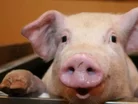Animal-human organ transplant trials expected in 2013

Scientists in the US believe the world is on the brink of a major medical breakthrough; the transplant of organs from animals into humans.
As an answer to the shortage of available organs and increasing transplant waiting lists, researchers have created genetically modified (GM) pigs with organs that are suitable to transplant into humans.
They are now hoping initial trials of pig to human organ transplants will begin in 2013, commencing with patients who have sight difficulties receiving the pig’s corneas.
As well as potentially curing blindness in humans, it is hoped organ transplants from GM pigs to humans will also help cure other ailments such as diabetes and brain diseases.
To read the latest edition of Healthcare Global, click here
- Nurses face jail if they discuss assisted suicide
- EU doctors need tougher tests to protect patient safety
- Poo, E.coli and bacteria all found on mobile phones
To make their organs compatible with humas, the GM pigs have had the pig protein galactosyltransferase removed because it would have been rejected by the human immune system.
Writing in medical journal The Lancet, the scientists from Pittsburgh University said: “With new genetically modified pigs becoming available that are likely to improve the outcome of cellular and corneal xenotransplantation further, we believe that clinical trials will be justified within the next two to three years.”
However, they have admitted bigger organ transplants of livers, kidneys and hearts are still a number of years away after studies on cross-species animal transplant trials have shown clots and excessive bleeding occur in these instances.
The research team said: “These problems mean that the longest survival time for pig organs in non-human primates to date ranges from a few days for lungs to around six to eight months for hearts, and trials of solid organ transplants of this nature in humans are likely to be several years away.”
There are also concerns that such transplants could trigger a new disease pandemic if viruses move from animals into humans.
Until now, using mechanical organs as a replacement or using stem cells to construct simple structures such a wind pipes are the only alternative transplant options that have been explored.
Our magazine is now available on the iPad. Click here to download it.



